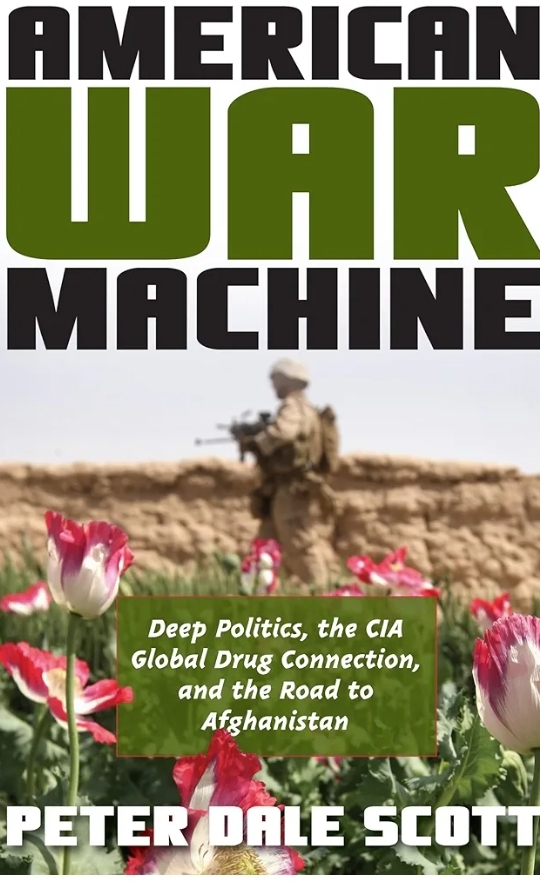“American War Machine: Deep Politics, the CIA Global Drug Connection, and the Road to Afghanistan” by Peter Dale Scott delves into the hidden dynamics of American foreign policy, particularly how covert operations, drug trafficking, and deep political networks have shaped U.S. actions abroad. Scott, a former Canadian diplomat and political analyst, examines the intersection of state and non-state actors that collectively form what he calls the “American War Machine.” His book reveals the often unseen connections between the CIA, global drug trafficking networks, and U.S. military interventions, especially in relation to the war in Afghanistan.
Key Themes and Arguments:
- Deep Politics and the “American War Machine”:
- Scott introduces the concept of “deep politics,” which refers to a hidden and covert layer of politics beneath the official government activities. This concept includes secret government operations, intelligence agency activities, and illegal enterprises such as drug trafficking.
- He argues that the “American War Machine” is a complex web of relationships between the U.S. government, intelligence agencies like the CIA, defense contractors, drug traffickers, and foreign governments. This network operates to sustain and expand U.S. power globally, often through means that are hidden from public scrutiny and outside of democratic accountability.
- CIA and the Global Drug Trade:
- A central thesis of the book is that the CIA has been deeply involved in the global drug trade since its inception. Scott provides historical examples of CIA involvement in drug trafficking, from the post-World War II era through the Vietnam War, the Iran-Contra affair, and into the current War on Terror.
- He argues that the CIA has often allied with drug traffickers and used drug money to fund covert operations, paramilitary groups, and proxy wars. This involvement has not only facilitated the spread of drugs but also contributed to the destabilization of regions, like Southeast Asia and Latin America, where U.S. geopolitical interests are at stake.
- The Road to Afghanistan:
- Scott examines how the events of 9/11 and the subsequent U.S. invasion of Afghanistan are deeply tied to the “American War Machine.” He traces the roots of U.S. involvement in Afghanistan back to the Cold War, particularly the CIA’s support for the Mujahideen fighters during the Soviet-Afghan War in the 1980s.
- The book discusses how the CIA’s covert operations in Afghanistan, including alliances with drug lords and warlords, contributed to the rise of the Taliban and the growth of the opium trade. Scott argues that U.S. interests in Afghanistan were not merely about fighting terrorism but also about maintaining control over the global drug trade and asserting geopolitical dominance in Central Asia.
- Interconnected Networks and the Continuity of Deep Politics:
- Scott emphasizes that deep politics is not confined to any single administration or period; instead, it is a continuous process that spans multiple decades and administrations. He describes how the same actors and networks involved in covert activities and drug trafficking in Southeast Asia in the 1960s and 1970s reappeared in Latin America in the 1980s and later in Afghanistan and Central Asia.
- He contends that these interconnected networks have a vested interest in perpetuating conflict and instability because such conditions allow for the continued operation of covert activities, black markets, and illicit funding mechanisms that sustain U.S. power and influence globally.
- The Role of Private Military Contractors and the Military-Industrial Complex:
- Scott discusses the growing role of private military contractors (PMCs) and defense companies in the “American War Machine.” He argues that these entities, which include firms like Blackwater (now Academi) and Halliburton, have a significant stake in perpetuating conflicts and military interventions.
- He highlights how PMCs are often involved in both overt and covert operations, providing plausible deniability for the U.S. government while profiting from war. The book suggests that the military-industrial complex’s influence has expanded beyond traditional defense companies to include a network of private actors who are integral to U.S. foreign policy.
- The Global Drug Trade and Geopolitical Control:
- The book explores how the global drug trade has been used as a tool of geopolitical control. Scott argues that drug trafficking provides a critical source of funding for covert operations and proxy wars, allowing the U.S. to project power in regions where direct military intervention is politically or strategically unfeasible.
- He discusses how the U.S. has often turned a blind eye to, or actively supported, drug traffickers when it serves larger geopolitical goals. For example, during the Cold War, the CIA supported various anti-communist groups and warlords who were heavily involved in the drug trade, from the Golden Triangle in Southeast Asia to Central America.
- Impact on U.S. Democracy and Civil Liberties:
- Scott warns that the activities of the “American War Machine” pose a significant threat to U.S. democracy and civil liberties. He argues that the concentration of power within the deep state, coupled with the lack of transparency and accountability, undermines democratic governance and the rule of law.
- The book highlights how the War on Terror has been used to justify a vast expansion of executive power, increased surveillance, and the erosion of civil liberties. Scott contends that this trend reflects a broader pattern in which the U.S. government uses crises, whether real or manufactured, to consolidate power and further the interests of the deep state.
- The Road Forward – Transparency and Accountability:
- Scott calls for greater transparency and accountability in U.S. foreign policy and intelligence operations. He argues that only by exposing the hidden networks and covert operations of the deep state can democratic oversight be restored.
- He advocates for a more informed and engaged citizenry, capable of challenging the secretive practices that perpetuate the “American War Machine.” He suggests that civil society, independent media, and international cooperation are critical in holding powerful actors accountable and preventing further abuses of power.
“American War Machine: Deep Politics, the CIA Global Drug Connection, and the Road to Afghanistan” offers a comprehensive and critical examination of the hidden dynamics that drive American foreign policy. Peter Dale Scott’s work exposes the intricate web of covert operations, drug trafficking, and deep political networks that underpin the U.S. global strategy. While some readers may view Scott’s analysis as controversial, the book raises important questions about the nature of power, accountability, and transparency in American democracy. Scott’s call for greater scrutiny of the hidden forces shaping U.S. policy remains a vital contribution to the ongoing debate over the role of the deep state in contemporary politics.







